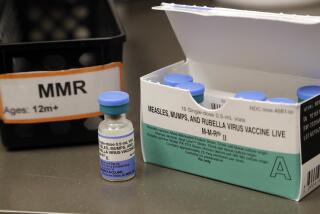Handling of Hepatitis Irks Parents
- Share via
Officials at a San Juan Capistrano elementary school were besieged Wednesday with angry parents complaining that they had not been told for two months that two brothers at the school had hepatitis A.
Health officials defended their decision as they prepared to inoculate hundreds of students and some staff today against the disease at Harold Ambuehl Elementary School, where a third student was reported with the illness last week.
Some parents of Ambuehl students said the school withheld critical information about the cases. Others wrongly thought the disease generally carries lifelong consequences, which is true of hepatitis B and C, but not A.
Kim Herkewitz, whose son is a fifth-grader at Ambuehl, said she would rather have known about the risk so she could have had a choice about immunizing her son.
“This was poor judgment from the beginning,” she said. “This is a policy that would invite infection to take over.”
Some parents expressed their anger directly to school officials.
“I had one person get in my face who was very angry,” Ambuehl Principal Cheryl Spetrino said. “She wanted to know why I didn’t let parents know that kids were sick before.”
Spetrino said that information about the first two cases of the disease, which involved brothers in kindergarten and fourth grade, was closely held on the advice of officials at the Orange County Health Care Agency. It wasn’t until a third case appeared in a fourth-grade student that school officials decided to inform parents.
The March 14 letter explained the situation and informed parents that inoculations are available at the district’s weekly immunization clinic.
Things escalated Tuesday, when county epidemiologist Dr. Hildy Meyers had school officials send home a letter from her office recommending that children receive gamma globulin shots to protect against the disease, prompting parents to criticize both school and county health officials.
Meyers defended her decision to withhold initial disclosure, saying to do otherwise might have caused unnecessary hysteria and misuse of medical resources. While household transmission of hepatitis A is common, it is rarely transmitted through classroom contact, she said.
“It was a judgment call” that followed state and federal guidelines, Meyers said. “We had no reason to think there was transmission at school.”
Other health experts supported the decision, calling it a conservative approach warranted by the situation.
“I would agree with it,” said Dr. Jasjit Sing, a pediatric infectious disease specialist at Children’s Hospital of Orange County. “Classroom transmission by kids at that age would be very unusual.”
Hepatitis A, unlike hepatitis B and C, is not a chronic disease. In more than 99% of the cases in the young, children have no lasting symptoms and recover completely, several experts said.
Symptoms include jaundice, vomiting, lack of appetite, malaise, sometimes fever, abdominal pain and can range from serious to mild. Younger children often can have milder symptoms.
But Sing noted that the disease is contagious before symptoms arise, which “makes it more difficult for stopping transmission.”
Health experts encourage hand washing as the best method of prevention, particularly after using the toilet and before eating. The virus is transmitted through contact with contaminated feces and blood.
A vaccine was developed for hepatitis A and B in the 1970s. And the national Centers for Disease Control and Prevention in Atlanta for the first time this year is supporting inoculation for children between age 2 and 18 in 11 states, which have 20 cases per 100,000 population, including California.
It takes about a month, however, for antibodies to form after vaccination, said Dr. Loring Dales of the immunization branch of the California Department of Health Services.
Instead, students and employees at Ambuehl will be given shots of immune globulin to boost their immune systems.
“It protects right away against the disease, but it’s effective for about three months,” Dales said.
The county Health Care Agency is investigating illnesses that may be hepatitis A in two other students at a middle school and another elementary school in the district, Assistant Supt. Doreen Lohnes said.
Meyers would not confirm that, but noted that with about 100 cases a year in children, such investigations would not be unusual.
In general, Orange County has a relatively low rate of reported cases of hepatitis A. In 1999, the Health Care Agency reported 267 cases, or 9.6 per 100,000 people. In 1998, there were 228, or 8.2 per 100,000.
“These are low rates for us historically,” Meyers said. “The peak in modern times is 35.7 [per 100,000] in 1977.”
More to Read
Sign up for Essential California
The most important California stories and recommendations in your inbox every morning.
You may occasionally receive promotional content from the Los Angeles Times.













